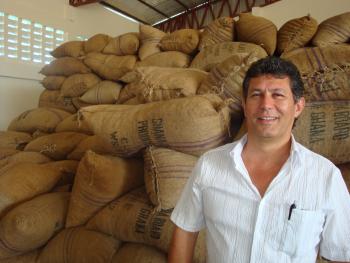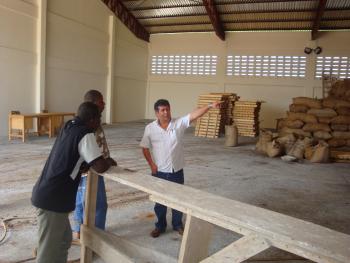Brazilian Firm to Set Up Large-Scale Cashew Processing Facility in Ghana
The Usibras Group, an ACA member and one of Brazil’s leading cashew businesses, will break ground this month on a $15M cashew processing factory in Ghana. Since being introduced to the African market by ACA in 2008, Usibras has gradually become involved in business across the continent, exporting raw cashew nuts from Ghana, Benin, Cote d’Ivoire, and Burkina Faso. Now, Usibras will further establish themselves as a major West African processor, with their 35,000MT capacity facility to be built in Prampram, 50 km east of Accra. The project is spearheaded by Tarciso Falcao, Director of Usibras Ghana Limited, the company’s local subsidiary, with the support and vision of Francisco Assis Neto, President of Usibras. In a May 23 interview with ACA, Mr. Falcao and Mr. Assis Neto shared their thoughts on the new facility, future goals, and developing the cashew industry in Ghana.
 Francisco Assis Neto and Tarciso Falcao with Ghana Minister of Trade and Industry (second from right). Source: Modern Ghana
Francisco Assis Neto and Tarciso Falcao with Ghana Minister of Trade and Industry (second from right). Source: Modern Ghana
ACA: What did you look at in terms of location while deciding, why did you choose Ghana?
Tarciso Falcao: We have a long history here. We started working with ACA in 2008, and attended our first conference in Tanzania. After that, we started doing feasibility studies to determine where we should start cashew business in Africa. We found Ghana to be the best country because of its political stability, and because it is growing economically.
What is your current involvement in Africa?
We are buying raw cashew nuts from Cote d’Ivoire, Benin, Burkina Faso, and concentrating everything in Tema. This is our third year – last year we exported 30,000MT. Right now that is all exported to our factories in Brazil.
What we’ve been doing so far is trying to secure that we can buy volume of cashews to process in our plant. From our experience so far, we see that is not a limitation.
Can you tell us a little more about your factory? When do you plan to be operational?
We start construction this month, and our target is to open by June next year.
We’ve invested $10-15M in the factory itself. We also have a 2nd phase side project for generation of power. It will be using the cashew shell as an alternative fuel. We will generate power that will supply for our factory and for the community, working with ECG.
Our process is completely mechanized, so we don’t use any hand shelling. We have been able to improve our technology to reduce breakage, and we also believe we will be using more labor on some of our productions. We think we will create as many as 2000 direct jobs, and more indirectly.
You’ve worked with ACA pretty closely as you began operations in Africa – what did ACA help you with?
 Tarciso Falcao at Usibras Ghana's warehouse in Tema, Ghana.
Tarciso Falcao at Usibras Ghana's warehouse in Tema, Ghana.
We’ve had very good relations since the beginning. We were introduced to the African Market by ACA. We’ve been ACA members since that time, and we’ve been attending the conferences for years. We try to help each other – for example we arranged for [ACA MD] Christian Dahm to visit our processing facilities in Brazil, so he could learn and bring this information back to ACA.
We have this supportive relationship between our company and ACA, and we intend to keep that going. We are trying to work more with the farmers, as we develop the sustainability of our business. This is an area that we hope to have some good discussions on and work closely with ACA. The support we have from ACA on these projects will be very important. Our idea is that once we have a factory here, we will work together with ACA and the government to promote farmers, increasing production of cashew nuts.
What are the main markets for Usibras kernels after processing?
We export most kernels to the US, where we have a factory in New Jersey for roasting. We then sell to US market, to large buyers like Costco, and we also have a lot of shipments to Europe. The idea here in Ghana is the same.
Do you plan to build relationships with certain farming or production areas?
We have already started conversations with farmers associations since starting working with ACA, and so we’ve had relationships with these people for some time. We buy from intermediaries now, but more and more we are trying to buy cashews directly from farmers.
We feel like Ghana could reach the same production as Côte d’Ivoire, and take advantage of the possibilities to use the cashew apple and juice. To keep the cashew farms sustainable, we need to use everything the farm can create. For example, with pruning, which will increase productivity, the wood can be used for charcoal and avoid cutting of native trees. We are trying to share information and technology but we need to work with ACA, there are other companies that can do that as well. In the future, I would like to sign some kind of MOU with ACA, the government, and maybe some other companies to show that we are committed to working together for the farmers.
 Usibras plans to begin operations at its new factory by June 2014
Usibras plans to begin operations at its new factory by June 2014
What is the benefit of having a Usibras factory in Ghana?
We wanted to establish business here because our feasibility studies showed that it would be a good opportunity, and we hoped to grow as a company worldwide. It was time to grow in Africa, where there is plenty of cashew production but the shelling capacity is almost nothing. It will give us also a better position as a supplier of cashew kernels as we can balance our productions between Brazil and here. Through our work in Ghana, Usibras can improve our competitiveness in the market and develop the processing industry here.



Comments
raw cashew nut
i want to buy raw cashew kishoresewkani@gmail.com
Raw cashews